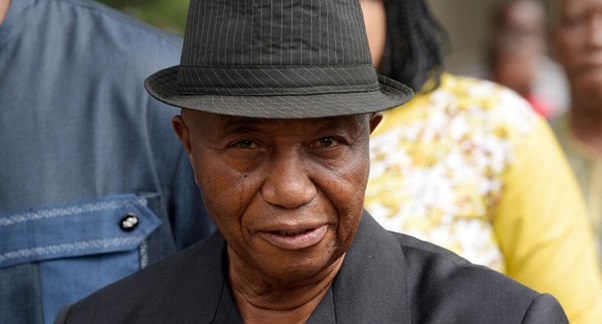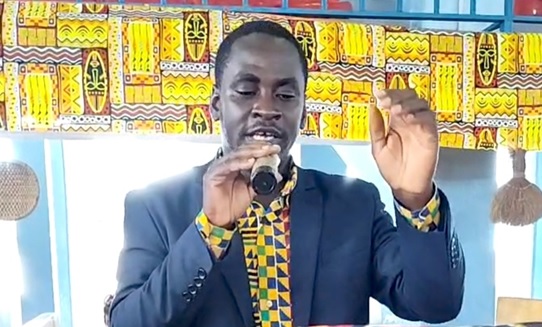MONROVIA – Accountability and transparency are becoming significant points of contention in the relationship between President Joseph Nyuma Boakai and one of his staunch supporters, Martin Kollie. Kollie, Chairman Emeritus of Research and Policy Response for the JNB for President 2023 campaign, has expressed his disenchantment with President Boakai’s governance in today’s Facebook post.
In his post believed to be directed at Pres. Boakai, Kollie wrote, “I am shedding tears. I went to the extreme for this man and damaged so many relationships just to make sure that our PEOPLE have a NEW DAY and a NEW DAWN; for them to have a breakaway from poverty after 177 years of misery.”
Kollie, known for his critical political commentary against the previous Coalition for Democratic Change (CDC) government under former Pres. Weah, accused them of massive corruption and actively campaigned against the CDC during the 2023 presidential election that brought Boakai to power.
Martin Kollie, who currently lives in exile, and Pres. Boakai’s relationship is now taking an unfriendly twist. His post has generated significant attention, with over 299 comments and 32 shares, reflecting his strong belief that President Boakai would break away from the status quo. The public reactions to Kollie’s post highlight a mix of support, criticism, and disappointment.
Kollie’s disillusionment stems from what he perceives as a lack of decisive action and transparency from the Boakai administration. “I had hoped for transformative leadership that would break the cycle of poverty and corruption in our country,” Kollie stated. “Instead, it seems like we are witnessing a continuation of the same old practices that have kept Liberia in a state of underdevelopment.”
Kollie’s remarks reflect a broader sentiment of frustration among those who had hoped Boakai’s presidency would bring significant change. Many supporters are now questioning whether the promises made during the campaign will be fulfilled. The perceived failure to address key issues such as poverty, corruption, and lack of infrastructure development is becoming a major point of criticism.
Musa Sheriff commented, “Especially your attempt to discredit Mr. Alexander B. Cummings’ reputation and credibility he has built for himself over many decades to sell oldma Boakai during the election was mind-boggling. I know it was a political season. I hope you will understand moving forward that human beings are unpredictable. I will never blame you for this president’s failure because you’ve wasted no time to make your position clear on the type of government you want.”
Ruth Doe added, “I just feel sorry for people who follow individuals like Martin K. N. Kollie Advie. Why did you first see him before persuading the Liberian people to support him? Could someone who served as vice president for 12 years effectively have failed to improve his own hometown, even though you witnessed it and managed to get people to vote for him? Do you believe that he could not have made a positive difference in the previous 12 years that he served as vice president? You keep putting old wine in new bottles while expecting change. Liberian people, you will be just fine; you have plenty of tears to share.”
Other reactions were more critical of Kollie’s past support for Boakai. Abraham Darbeh Hoto wrote, “But you never had a voting card. Besides, you never voted for this man. Let those who stood under the rain cry. Oops, anyways, we agree!” Similarly, Masawo Jallah commented, “Martin K. N. Kollie, this is incredibly emotional! But that’s life, so stay true to yourself and your mother’s land.”
The controversy surrounding President Boakai’s governance style and Martin Kollie’s disillusionment has sparked widespread debate among critics, political commentators, and ordinary citizens. Opposition political leaders are keenly observing this unfolding drama, anticipating more embarrassing statements aimed at Boakai’s early leadership from Kollie. This situation underscores the growing challenges President Boakai faces in maintaining the support and confidence of his allies and the Liberian people.
Martin Kollie’s discontent is also seen as a warning sign for other loyalists and supporters of President Boakai. “The fight for a better Liberia must continue, but it requires a leader who is committed to genuine change,” Kollie remarked. “I still believe in the cause, but my faith in the current leadership is waning. We cannot afford to let our hopes be dashed by another administration that fails to deliver on its promises.”
The reactions to Kollie’s statement reflect a deepening rift within the Unity Party’s support base. Critics argue that this internal conflict could weaken the party’s ability to govern effectively and meet the expectations of the Liberian people. As the government grapples with these challenges, the call for accountability and transparency remains louder than ever.
As the situation unfolds, all eyes are on President Boakai to see how he will respond to these criticisms, bridge the growing divide, and demonstrate his commitment to the promises, especially regarding accountability and transparency, made during the campaign.







